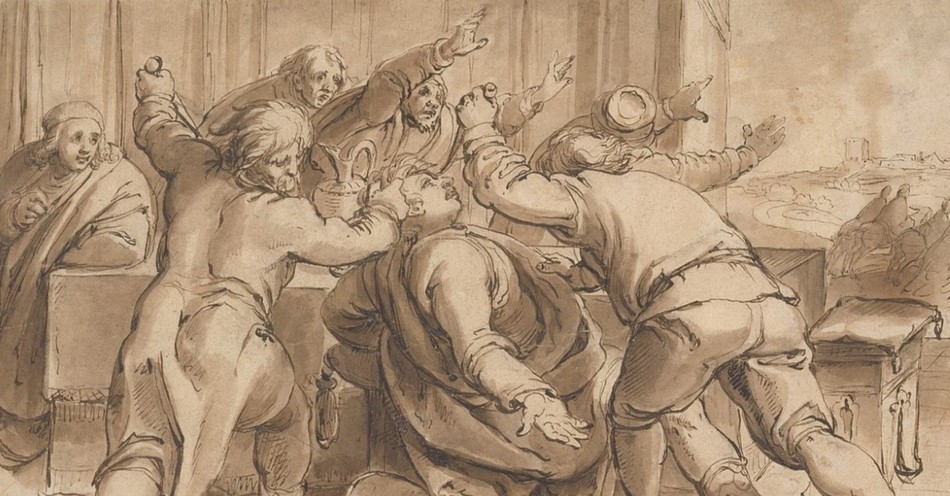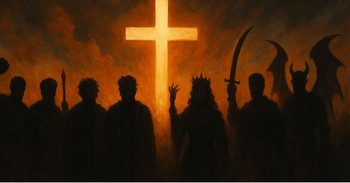Amnon was the son of King David and Ahinoam, one of David’s first wives. Known for his lustful, selfish, and cruel behavior, Amnon wreaked havoc on David’s family, creating chaos for years.
Which of David’s Sons Was Amnon?
We know from Scripture that David took many wives and had many children during his tenure as king. Though David may have rationalized the taking of multiple wives, his many marriages violated God’s instructions on marriage provided in the Torah (Deuteronomy 17:14-17).
David’s first children were born in Hebron, where David was made king following the death of King Saul (2 Samuel 2:1-4; 1 Chronicles 3:4).
His first six sons, as recorded in 2 Samuel 3:1-5 and 1 Chronicles 3:1-4, were Amnon, Chileab, Absalom, Adonijah, Shephatiah, and Ithream—each son born to a different mother.
In Amnon’s case, David’s firstborn was the son of Ahinoam of Jezreel (1 Samuel 25:43). David had taken Ahinoam to be his wife around the time he married Abigail, the widow of Nabal (1 Samuel 25:42).
Not much is known about Amnon’s mother. However, we know that Amnon was the firstborn son of David and was born in Hebron, where David ruled as king for seven years.
As David’s firstborn son and heir, Amnon would have been the first in line to succeed his father on the throne of Israel.
What Sin Did Amnon Commit?
We don’t know what kind of childhood Amnon had growing up or his relationship with his father. Many of Amnon’s early years were probably spent on the run with his family as David hid from King Saul.
Was David an absent father, too focused on hiding from Saul or fighting other battles with his mighty men to train and temper his sons in their formative years? We do not know. However, the kind of young man Amnon became may give us some insight into David’s lack of awareness, discernment, and possible negligence in dealing with his son’s more problematic behavior.
For example, in 2 Samuel 13, we read that Amnon became consumed with lust for his beautiful half-sister Tamar. Advised by his shrewd and manipulative cousin Jonadab, Amnon pretended to be ill, asking his sister to take care of him.
Blind to his son’s impulses and intentions, David sent Tamar to her brother. When Tamar arrived, Amnon proceeded to rape her (2 Samuel 13).
Having gratified his sexual appetites, Amnon then “hated her (Tamar) with a very great hatred; for the hatred with which he hated her was greater than the love with which he had loved her” (2 Samuel 13:15).
Perhaps worse than the initial act, Amnon sent Tamar away, making it seem like she was complicit or even responsible for his shameful act. Amnon then treated Tamar as a used and undesirable outcast, a reputation she likely carried for the rest of her life.
From then on, Tamar “put ashes on her head and tore her long-sleeved garment which was on her; and she put her hand on her head and went away, crying aloud as she went” (2 Samuel 13:19).
What Did David Do When He Heard about Amnon’s Sin?
When David learned that his oldest son and heir had raped Tamar, the Bible says that “he was very angry” (2 Samuel 13:21). Unfortunately, David’s response to such a heinous act from his oldest son seems limited to indignation.
Nowhere in Scripture do we encounter David’s reprimanding and disciplining his oldest son. We also do not see if (or how) David administered justice and provided for his daughter in her hour of shame.
Does this mean that David did nothing in response to Amnon’s sin? We do not know. However, it seems apparent from Scripture that David partially abdicated his responsibility as a father and king, not doing what was right by his daughter and son.
Furthermore, in failing to punish Amnon and provide for Tamar, David left the door open for another to claim that responsibility.
What Did Absalom Do to Avenge Amnon’s Sin?
When Absalom, David’s third son, found out that Amnon had raped his sister, he too was rightly indignant (2 Samuel 38:22). As her older brother and protector, Absalom took Tamar into his house and provided for her the rest of her life. She remained childless and unmarried.
For most people, the stench of Amnon’s malicious behavior eventually faded. Absalom, however, never forgot what his brother had done. Consumed with hatred, Absalom refused to even speak to Amnon for two years. During that time, he plotted his revenge.
When the opportunity presented itself, Absalom planned a sheep-shearing festival in the village of Hezor and invited his father and brothers to attend. When David declined, Absalom requested that Amnon go in his place. There, Absalom murdered his younger brother (2 Samuel 13:28-29).
Absalom had avenged his sister. However, his act of vengeance was seen as unacceptable in the eyes of God. This was not justice; it was premeditated murder. For this reason, Absalom had nowhere to hide. The cities of refuge would not harbor him. All he had left to do was flee Jerusalem and seek sanctuary with his grandfather, Talmai, the king of Geshur. There he remained for three years (2 Samuel 13:37).
Scripture says David mourned for Amnon and eventually wanted to bring Absalom back to Jerusalem. However, fearing what the people might think if their prince’s murderer returned without facing any consequences for his actions, David remained separated from his son.
Eventually, David recalled Absalom to Jerusalem to be with his family. However, Absalom’s absence had not fostered a deeper love and respect for his father. David’s inability to identify Amnon’s character, punish his oldest son, and administer justice on behalf of his daughter only made Absalom more bitter. It also encouraged the belief in Absalom’s mind that his father had become weak, ineffective, and incapable of leading the nation, let alone his own family.
As a result, Absalom rebelled against his father and plunged the kingdom into another civil war. Joab, David’s general, eventually killed Absalom (2 Samuel 18).
Can We Learn Anything from Amnon and David’s Mistakes?
It’s safe to say that David’s family was never the same after Amnon and Absalom’s deaths. So what can we learn from Amnon and David’s mistakes?
1. Children Learn by Example
There are many things David’s sons probably learned from their father by simply watching him.
Hearing stories of David’s triumph over Goliath and the Philistine armies, they learned about the value of courage. Watching him prepare and train for battle, they had learned about discipline and the art of war. Watching him interact with his trusted mighty men and fellow soldiers, they learned of loyalty and friendship. Watching him write songs and pray to God, they encountered a heart of worship and surrender. And watching David fulfill his duties as king, they learned about leadership.
Amnon and Absalom had also grown up as half-brothers, meaning they were fully aware of how faithful David was to their mothers.
And while we don’t know how old Amnon and Absalom were when David had his affair with Bathsheba, it is ironic that the very sin that nearly ruined David’s life (lust) was the same sin, left unchecked, that plagued Amnon.
The sons of David learned a lot from his example. Sadly, that included some serious flaws that soon became part of their own character.
2. Swift Discipline Avoids Future Disaster
We don’t know what kind of father David was when his sons were younger. However, the one thing we see is that David did not seem to know what kind of men his sons had become as they grew older.
Blind to his oldest sons’ lustful desires, David sent his daughter into Amnon’s chambers, where she was raped.
David also failed to identify Absalom’s rage and hatred of his brother when he allowed Amnon to visit Baal-Hazor, where he was eventually murdered.
In both instances, David proved completely undiscerning and unaware of his sons’ character (or lack thereof). Unfortunately, David should have known from his own failures that unchecked lust and anger often turn into unchecked action.
A father’s guidance and swift intervention could have tempted or avoided Amnon’s lust, Absalom’s rage, and the following disaster.
3. Weakness Breeds Resentment
In failing to properly admonish Amnon and administer justice on behalf of his daughter Tamar, David allowed Absalom’s hatred to burn like wildfire in his heart. It’s safe to say that Absalom never had the same respect for his father after that. He concluded he had the ability (and responsibility) to do what his father no longer could, even if that meant usurping his father’s throne.
Is it possible that Amnon had also come to view his father as weak and ineffective by the time he raped his sister? We do not know. It seems neither Amnon nor his cousin Jonadab feared any consequences of their actions. We are left to wonder, then, how much had Amnon gotten away with as the oldest son and heir to the king?
Amnon also didn’t try to cover up his sin. He knew what he had done. His brothers knew. Worst of all, David knew. And what happened? Not much.
In all likelihood, Amnon never feared his father’s reprisal because he no longer respected him. Absalom took that resentment to its next logical conclusion, promising to administer justice to a people who had lost faith in their king, as he had lost faith in his father.
Therefore, in David’s failures, we learn that weak and ineffective fathers, like kings, inspire resentment, or worse, rebellion, in their sons and subjects.
Photo Credit: sixteenth- or seventeenth-century drawing by Karel van Mander the Elder of Absalom killing Amnon. Public domain image, via Wikimedia Commons.

This article is part of our People of Christianity catalog that features the stories, meaning, and significance of well-known people from the Bible and history. Here are some of the most popular articles for knowing important figures in Christianity:
How Did the Apostle Paul Die?
Who are the Nicolaitans in Revelation?
Who Was Deborah in the Bible?
Who Was Moses in the Bible?
King Solomon's Story in the Bible
Who Was Lot's Wife in the Bible?
Who Was Jezebel in the Bible?
Who Was the Prodigal Son?



